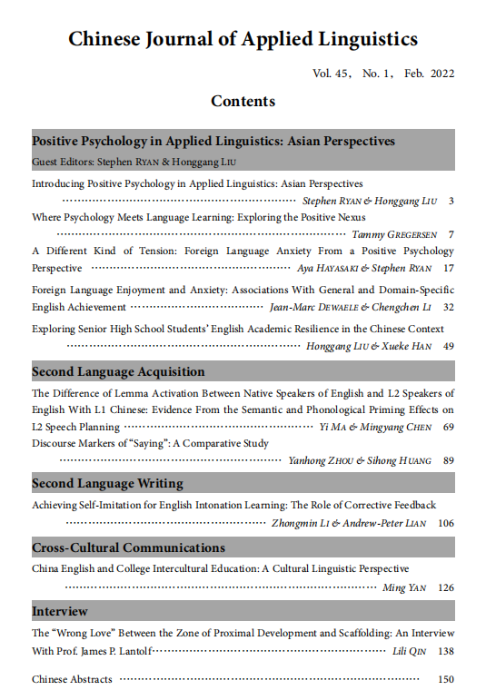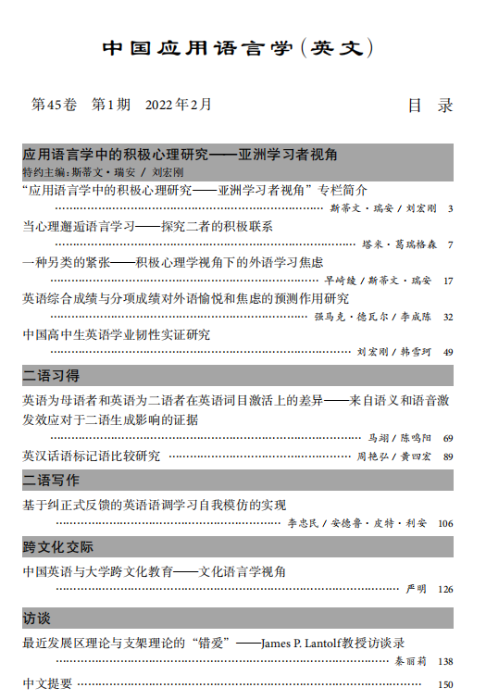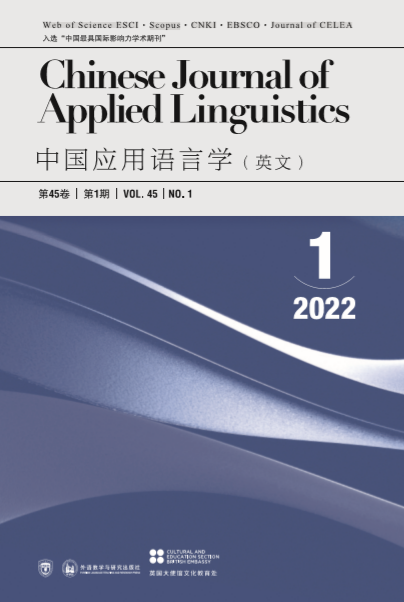《中国应用语言学(英文)》2022年第一期目录摘要
本期目录


本期摘要
Introducing Positive Psychology in Applied Linguistics: Asian Perspectives
Stephen RYAN
School of Culture, Media and Society, Waseda University, Japan
Honggang LIU
School of Foreign Languages, Northeast Normal University
It is not so long ago that research into foreign language education was concerned with little beyond language and teaching; foreign language education was very much a teacher-centered activity and the research agenda reflected this. Language education was regarded as a matter of applying the appropriate teaching technique to the language point being taught in the assumption that learning would automatically occur; research was there to serve this simplistic model of language education as a unidirectional transfer of mental knowledge. Fortunately, towards the end of the 20th century researchers and educators began to show a greater interest in the contributions learners made to their own learning. This move to a more learner-centered approach to teaching and research was operationalized through concepts such as strategies, styles, beliefs, and, the most extensively researched learner characteristic of them all, motivation. The introduction of positive psychology perspectives (Dewaele et al., 2019) takes foreign language education past these essentially cognitive concepts towards a more person-centered approach, expanding the research agenda beyond its narrow linguistic base, considering the whole person and not just the language learner within that person.
Where Psychology Meets Language Learning: Exploring the Positive Nexus
Tammy GREGERSEN
Department of English, College of Arts and Sciences, American University of
Sharjah, UAE
Keywords: positive psychology, wellbeing, interventions, emotions, signature strengths, savoring, gratitude
Abstract
This paper provides an overview of positive psychology (PP), or the study of elements that make life most worth living (Peterson, 2006), and demonstrates its efficacy by detailing five intervention studies. By aligning PP objectives and linguistic aims in second language teaching and learning, the studies show multiplied, concurrent results, heightened teacher and learner wellbeing and improved language proficiency. One important caveat is that PP interventions work best when they cater specifically to individual learners.
A Different Kind of Tension: Foreign Language Anxiety From a Positive Psychology Perspective
Aya HAYASAKI & Stephen RYAN
Graduate School of Letters, Arts and Sciences, Waseda University, Japan
Keywords: anxiety, engagement, enjoyment, positive psychology, relationships, social comparisons, tension
Abstract
This study investigates anxiety in foreign language learning from a positive psychology perspective, and in doing so, it considers some of the ways in which anxiety can interact with other aspects of language learner psychology to contribute to improved learning outcomes and improved learner well-being. The paper reports on a small-scale mixed-method study of English learners at a university in northern Japan. It shows how for many learners some of the most anxiety-provoking episodes were also the most rewarding and enjoyable, suggesting a need to reconsider simplistic accounts that present anxiety as an impediment to successful language learning. This is done by shifting to a positive psychology perspective. The paper concludes with a tentative model of how anxiety, when reframed as tension, can function as a core component of a more productive language learning experience.
Foreign Language Enjoyment and Anxiety: Associations With General and Domain-Specific English Achievement
Jean-Marc DEWAELE
Birkbeck, University of London
Chengchen LI
School of Foreign Languages, Huazhong University of Science and Technology
Keywords: foreign language enjoyment, foreign language (classroom) anxiety, positive psychology, control-value theory
Abstract
Recent research has confirmed the predictive effect of general foreign language (FL) achievement on Foreign Language Enjoyment (FLE) and Foreign Language Classroom Anxiety (FLCA). However, few studies have examined the effect of domain-specific language achievement in shaping FL learning emotions. The present study thus aims to examine how FLE and FLCA are linked to overall FL achievement and self-perceived achievement in six different domains across listening, speaking, reading, writing, vocabulary, and grammar. A total of 1, 415 Chinese senior secondary students participated in the questionnaire survey. Regression analyses showed that 1) both FLE and FLCA were predicted more by self-perceived general English proficiency, while less by actual English achievement; 2) perceptions of speaking and grammar competence were significant predictors of both emotions; 3) perceived reading competence predicted FLE significantly but not FLCA; and that 4) perceptions of listening, writing, and vocabulary competence predicted neither FLE nor FLCA. The implication is that domain-specificity should be taken into consideration in future explorations of FL emotions.
Exploring Senior High School Students’English Academic Resilience in the Chinese Context
Honggang LIU
Northeast Normal University
Xueke HAN
Changping No.2 High School of Beijing
Keywords: senior high school students, English academic resilience, English achievement
Abstract
While academic resilience has been a hot topic in positive psychology, there is still scope for researchers to explore it in the field of applied linguistics. Drawing on the framework of L2 (second language) learners’ resilience proposed by T. Y. Kim and Y. K. Kim (2017), the current study aims to examine senior high school students’ English academic resilience (EAR) and its relationship to their English achievement (EA). This study comprises a survey of 454 senior high school students. Follow-up interviews were carried out to triangulate the quantitative findings. The descriptive results demonstrate that students’ EAR is above the average, and its five subscales obtain medium to medium-higher levels due to the mean scores. It shows that students have good EAR that enables them to deal with academic adversity. The correlational analysis shows a low positive correlation between EAR and EA in general, and the subscales share medium to low correlations with students’ EA. EAR has a certain influence on EA, but the correlation may be influenced by other learner variables. Based on the results, suggestions on improving students’ EAR are provided.
The Difference of Lemma Activation Between Native Speakers of English and L2 Speakers of English With L1 Chinese: Evidence From the Semantic and Phonological Priming Effects on
L2 Speech Planning
Yi MA
Foshan University
Mingyang CHEN
Neusoft Institute Guangdong
Keywords: Semantic priming effect, phonological priming effect, lemma activation, L2 production
Abstract
This study examined the influence of semantic and phonological priming on L2 speech planning, as well as the difference between native and non-native speakers of English in terms of lemma activation. Two potential explanations for the contrast between the performance of L2 speakers and native controls were considered. The first of which was that L2 speakers’ phonological forms are activated before selection of syntactic frame occurred, whereas the reverse is true for native speakers. The second explanation posits that the organisation of the speech production procedure is fundamentally similar in native and L2 speakers, and the disparity in performance arises from difference in the levels of activation of stored items. The results of the present experiment suggest that lemma selection is indeed what drives syntactic frame selection. However, lemmas in L2 speakers can be primed through a chain of connections demonstrated as: L2 phonological form →L1 phonological form → L1 lemma.
Discourse Markers of “Saying”: A Comparative Study
Yanhong ZHOU & Sihong HUANG
Hangzhou Normal University
Keywords: discourse markers (DMs), saying, The Selected Works of Deng Xiaoping (Volume III), speech act, translation
Abstract
The present study compares the discourse markers (DMs) of “saying” in Mandarin Chinese ke yi shuo (lit. “can say”) and ying gai shuo (lit. “should say”) with their equivalents in English, by drawing the parallel corpora from The Selected Works of Deng Xiaoping (Volume III) (henceforth The Works), so as to uncover the pragmatic motivation for the variation in translating the DMs of “saying.” The analysis is conducted within a theoretical framework of speech act theory, by grouping the DMs according to their personal pronouns. Moreover, by comparing the uses of personal pronouns in English and Chinese, the current study confirms that The Works keeps the consistency between the two languages as well as with the characteristics and styles of Deng Xiaoping’s locution. It also finds that modalized DMs of “saying” (e. g., “I should say”), as a parenthesis, lose their status as matrix clauses and help reduce the tone of affirmation.
Achieving Self-Imitation for English Intonation
Learning: The Role of Corrective Feedback
Zhongmin LI
Hunan University of Arts and Science
Andrew-Peter LIAN
Suranaree University of Technology, Thailand
Keywords: corrective feedback, English intonation, motor theory, self-perception
Abstract
Corrective feedback is crucial for pronunciation teaching. However, in current pronunciation teaching practice, the corrective feedback provided usually fails to locate pronunciation problems and inform learners of the differences between their mispronunciations and the correct form. Based on the motor theory, this study attempted to explore a new way of corrective feedback for pronunciation teaching. Specifically, the learners’ speech output was modified and then was played back to them as an input model for learning. In this way, the learners can imitate the pronunciation model of their own voices, achieving self-imitation. This study included two experiments. The first explored the viability of obtaining one’s self-perceived voice through delayed feedback paradigm. The second experiment examined the effectiveness of self-imitation for English intonation learning. Results showed that imitating the pronunciation model of one’s own voice can reduce the learners’ phonological memory load, assist critical listening and facilitate accurate phonetic realizations of the target intonation.
China English and College Intercultural
Education: A Cultural Linguistic Perspective
Ming YAN
Shanghai Institute of Technology
Keywords: cultural linguistics (CL), intercultural competence (ICC), English as international language (EIL), China English (CE)
Abstract
In the era of globalization, English as an international language (EIL) is also the medium of intercultural communication for the international community. Based on the theory of cultural linguistics (CL), which regards language as culture-oriented rather than structure-oriented, Sharifian (2009, p. 4) has proposed that varieties of English which constitute EIL result from the interaction between the English language and different local cultures. CL suggests that China English (CE) should be understood in this light: It is not a substandard interlanguage, but a variety of English with its own cultural value and right. This paper intends to systemically analyze the nature of CE and its value in intercultural communication so as to better understand current intercultural education. Over a long time, much emphasis has been laid on the importance of adapting to the target language culture to the neglect of home language culture in our College English classrooms, thus resulting in what is known as Chinese cultural aphasia. In the light of CL, intercultural communication competence (ICC) encompasses not only knowing English and adapting to its culture, but also using CE to introduce the native culture in which CE plays an irreplaceable role. Therefore, CE is undoubtedly a key remedy for Chinese cultural aphasia. More research on CL should be conducted as it provides felicitous disciplinary guidance for our college intercultural education.
The “Wrong Love” Between the Zone of
Proximal Development and Scaffolding: An Interview With Prof. James P. Lantolf
Lili QIN
Dalian University of Foreign Languages
Keywords: ZPD, Scaffolding, Development, Internalization, Imitation
Abstract
The zone of proximal development (ZPD) and the scaffolding theory are very different, both in terms of their theoretical origins and connotations, and can even be said to be very different. However, during the development of the two concepts, some scholars have misunderstood them, resulting in the two being mistaken for similar concepts and therefore often confused. Professor James Lantolf from Pennsylvania State University (State College, USA) was interviewed by Professor Lili Qin from Dalian University of Foreign Studies (Dalian, China) and provides an in-depth analysis of these issues. The interview begins with the theoretical roots, connotations and definitions of the ZPD and scaffolding concepts, and then unravels the story of how they have been “mistakenly loved for life”, and ultimately it is made clear that the two concepts are completely different in their practical application to language teaching and should not continue to be used interchangeably.
《中国应用语言学(英文)》
Web of Science-ESCI 收录期刊
SCOPUS收录期刊

刊名: 中国应用语言学(英文)
主编: 文秋芳
出版社: 外研社
刊期:季刊
页数: 260
定价: 30.00元
邮发代号: 80-830
刊号:CN10-1474/H
征订方式
一、邮局征订:
请认准邮发代号80-830,前往各地邮局进行征订。
二、在线订购:
请用淘宝或天猫App识别下方二维码,搜索刊名进行全年订购。




